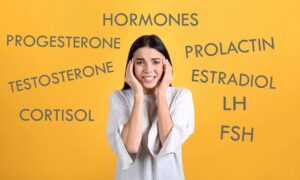 Aging brings a variety of natural changes in the body, including significant hormonal fluctuations. Shifting hormone levels can trigger uncomfortable symptoms with age, like fatigue, weight gain, poor focus, and low libido.
Aging brings a variety of natural changes in the body, including significant hormonal fluctuations. Shifting hormone levels can trigger uncomfortable symptoms with age, like fatigue, weight gain, poor focus, and low libido.
Understanding age-related hormone changes (and the solutions available to treat them) can bring clarity and comfort to the aging process. Read on to learn more!
How Female Hormones Change With Age
Around the age of 50, the ovaries start producing less estrogen and progesterone until menopause, when production halts completely. These are the primary female sex hormones, and they affect reproductive function, mood, bone health, fertility, and menstruation. The pituitary gland attempts to make up for declining estrogen and progesterone levels by making more FSH – follicle-stimulating hormone.
These hormonal changes can cause a range of symptoms, including:
- Hot flashes
- Irritability
- Depression
- Anxiety
- Vaginal dryness
- Painful intercourse
- Disrupted sleep
- Headaches
- Osteoporosis
- Low libido
How Male Hormones Change With Age
While men don’t go through menopause, they undergo a different stage of hormonal change: andropause. Andropause refers to the notable drop in testosterone production that many men experience in older age. Low testosterone levels in men can cause:
- Decreased muscle mass
- Poor stamina
- Low bone mineral density
- Low libido
- Erectile dysfunction
- Depression
- Fatigue
- Insomnia
- Poor concentration and memory
Managing Age-Related Hormone Changes
Thankfully, it’s possible to alleviate symptoms of age-related hormone changes. At The Center for Natural & Integrative Medicine, we implement many strategies to create personalized treatment plans for hormonal imbalances, including:
- Hormonal therapies
- Peptide Therapy
- Dietary changes
- Nutritional supplements, such as probiotics and vitamin D
- Intravenous therapy
- Detoxification
- Lifestyle changes, such as improving sleep quality and implementing an exercise regimen
- Alternative therapies, such as massage and acupuncture
If you’re experiencing the uncomfortable symptoms of hormonal imbalance, reach out to us today for a comprehensive evaluation.

